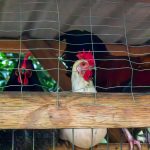Raccoons are intelligent and adaptable nocturnal mammals known for their resourcefulness in finding food, including chickens. These omnivores possess excellent climbing abilities, enabling them to scale fences and walls to access chicken coops. Once inside, raccoons can cause significant damage to both the chickens and the coop structure.
They are potential carriers of diseases such as rabies, posing risks to humans and other animals. Raccoons have several physical and cognitive advantages that make them effective predators of chickens. Their dexterous paws allow them to manipulate latches and locks, while their sharp teeth and claws can easily overcome weak barriers.
Raccoons also have a highly developed sense of smell, which helps them locate potential food sources from a distance. To effectively protect chicken flocks from raccoon attacks, owners must understand these animals’ behavior, capabilities, and hunting strategies. This knowledge is essential for developing and implementing appropriate preventive measures to safeguard chickens and their housing structures from raccoon intrusions.
Table of Contents
- 1 Securing the chicken coop: Tips for raccoon-proofing
- 2 Natural deterrents: Using plants and scents to keep raccoons at bay
- 3 Creating barriers: Fencing and other physical obstacles
- 4 Lights and sound: Using technology to deter raccoons
- 5 Proper waste management: Keeping food sources away from raccoons
- 6 Monitoring and maintenance: Regular checks to ensure raccoons stay away
- 7 FAQs
- 7.1 What are some effective ways to keep raccoons away from chickens?
- 7.2 Why are raccoons a threat to chickens?
- 7.3 What are some signs that raccoons are targeting my chickens?
- 7.4 Are there any natural deterrents for keeping raccoons away from chickens?
- 7.5 How can I make my chicken coop less attractive to raccoons?
Key Takeaways
- Raccoons pose a threat to chickens as they are known to attack and kill them.
- Securing the chicken coop with strong locks and latches can help prevent raccoon attacks.
- Planting strong-smelling herbs like mint and lavender can deter raccoons from approaching the coop.
- Installing fences and using hardware cloth to cover openings can create physical barriers to keep raccoons out.
- Using motion-activated lights and sound devices can scare off raccoons from the chicken coop.
Securing the chicken coop: Tips for raccoon-proofing
Inspect and Repair the Coop
Start by inspecting the coop for any potential entry points, such as gaps in the walls or roof, loose boards, or weak spots in the fencing. Repair any damage and reinforce weak areas to prevent raccoons from gaining access.
Use Durable Materials for Protection
Use heavy-duty materials such as hardware cloth or welded wire to cover windows and vents, as raccoons can easily tear through flimsy mesh or chicken wire. Make sure all doors and openings are secured with sturdy locks or latches that raccoons cannot manipulate.
Additional Measures for Maximum Protection
Consider installing a predator-proof apron around the perimeter of the coop to prevent raccoons from digging underneath the fencing. This can be achieved by burying hardware cloth or wire mesh several inches deep around the base of the coop and extending it outwards to form an apron. This will deter raccoons from digging their way into the coop and provide an additional layer of protection for your chickens. Regularly inspect the coop for any signs of damage or wear and tear, and promptly address any issues to maintain its integrity.
Natural deterrents: Using plants and scents to keep raccoons at bay

In addition to physical barriers, natural deterrents can be used to keep raccoons away from the chicken coop. Certain plants and scents are known to repel raccoons and can be strategically placed around the coop to discourage their presence. For example, planting marigolds, daffodils, or garlic around the perimeter of the coop can help deter raccoons, as they are known to dislike the strong odor of these plants.
Similarly, spreading cayenne pepper or garlic powder around the coop can create a barrier that raccoons will avoid. Another natural deterrent is the use of predator urine, such as that of coyotes or foxes, which can be purchased from garden supply stores. Sprinkling predator urine around the perimeter of the coop can create the illusion of a predator presence, causing raccoons to steer clear of the area.
Additionally, motion-activated sprinklers or lights can startle raccoons and deter them from approaching the coop. These natural deterrents can be effective in keeping raccoons at bay without causing harm to the animals.
Creating barriers: Fencing and other physical obstacles
Fencing is one of the most effective ways to keep raccoons out of the chicken coop. Use heavy-duty materials such as hardware cloth or welded wire with small openings to prevent raccoons from squeezing through or reaching in. The fencing should be at least 6 feet high and extend several inches underground to prevent raccoons from climbing or digging their way into the coop.
Regularly inspect the fencing for any signs of damage or wear, and promptly repair any issues to maintain its effectiveness. Consider adding an electric fence or wire around the perimeter of the coop for added protection. Electric fencing delivers a mild shock to any animal that comes into contact with it, effectively deterring raccoons from attempting to breach the barrier.
Make sure to follow safety guidelines when installing and maintaining electric fencing to prevent harm to both animals and humans. Additionally, consider adding a roof or cover over the chicken run to prevent raccoons from accessing the coop from above. This can be achieved using wire mesh or netting secured over the top of the run to create a secure enclosure for your chickens.
Lights and sound: Using technology to deter raccoons
Technology can also be used to deter raccoons from approaching the chicken coop. Motion-activated lights and sound devices can startle raccoons and discourage them from entering the area. Install bright lights around the perimeter of the coop that are triggered by motion to create a deterrent for nocturnal animals such as raccoons.
Similarly, sound devices that emit loud noises or predator calls can be effective in keeping raccoons at bay. These devices can be set to activate when motion is detected or on a timer to create a consistent deterrent for raccoons. Consider using a radio or other audio device to play loud noises or music near the coop to create a disturbance that raccoons will avoid.
The sound of human voices or loud music can disrupt the peace and quiet that raccoons seek, making them less likely to approach the coop. Additionally, consider installing security cameras around the coop to monitor for any signs of raccoon activity. This can help you identify potential entry points or weak spots in your defenses and take proactive measures to address them.
Proper waste management: Keeping food sources away from raccoons

Secure Storage of Feed and Water
Store chicken feed in secure containers that raccoons cannot open or access, such as metal bins with tight-fitting lids. Avoid leaving feed out overnight, as this can attract raccoons and other pests to the area. Similarly, keep water sources covered or elevated to prevent raccoons from drinking from them.
Regular Cleaning and Maintenance
Regularly clean up any spilled feed or food scraps around the coop to remove potential attractants for raccoons. This will help reduce the likelihood of raccoons visiting the area in search of food and discourage them from attempting to breach your defenses.
Minimizing Waste and Spillage
Consider using feeders that are designed to minimize waste and spillage, such as treadle feeders that only dispense feed when chickens step on a platform. This can help reduce the amount of food that is available to wildlife and minimize the risk of attracting raccoons to the area.
Monitoring and maintenance: Regular checks to ensure raccoons stay away
Regular monitoring and maintenance are crucial for ensuring that raccoons stay away from the chicken coop. Conduct regular checks of the perimeter fencing, doors, windows, and roof of the coop to look for any signs of damage or wear. Promptly address any issues to maintain the integrity of your defenses and prevent raccoons from gaining access.
Additionally, monitor for any signs of raccoon activity around the coop, such as tracks, droppings, or damage to nearby vegetation. Consider setting up motion-activated cameras or wildlife cameras around the coop to monitor for any signs of raccoon activity during the night. This can help you identify potential entry points or weak spots in your defenses and take proactive measures to address them.
Regularly review footage from the cameras to assess any potential threats and make adjustments as needed to keep raccoons at bay. By staying vigilant and proactive in your monitoring and maintenance efforts, you can help ensure that your chickens remain safe from raccoon attacks. In conclusion, protecting your chickens from raccoon attacks requires a multi-faceted approach that includes securing the coop with physical barriers, using natural deterrents, employing technology, managing food sources, and conducting regular monitoring and maintenance.
By understanding the threat that raccoons pose and taking proactive measures to protect your flock, you can create a safe and secure environment for your chickens to thrive. With careful planning and consistent efforts, you can effectively deter raccoons from accessing the chicken coop and minimize the risk of harm to your chickens.
If you’re looking for ways to keep raccoons away from your chickens, you may want to check out this article on how to build a chicken coop trampoline. This innovative solution can help protect your chickens from predators like raccoons while also providing them with a fun and stimulating environment.
FAQs
What are some effective ways to keep raccoons away from chickens?
Some effective ways to keep raccoons away from chickens include securing the chicken coop with strong locks, using motion-activated lights or sprinklers, and installing an electric fence around the coop.
Why are raccoons a threat to chickens?
Raccoons are a threat to chickens because they are skilled predators and can easily break into chicken coops to prey on the birds. They are also known to carry diseases that can be harmful to chickens.
What are some signs that raccoons are targeting my chickens?
Some signs that raccoons are targeting your chickens include missing or injured birds, damage to the chicken coop or fencing, and tracks or droppings around the coop.
Are there any natural deterrents for keeping raccoons away from chickens?
Some natural deterrents for keeping raccoons away from chickens include using strong-smelling substances like ammonia or predator urine around the coop, and planting thorny bushes or plants near the coop to create a barrier.
How can I make my chicken coop less attractive to raccoons?
You can make your chicken coop less attractive to raccoons by keeping the area around the coop clean and free of food scraps, securing any potential entry points, and removing any potential hiding spots for raccoons.
Meet Walter, the feathered-friend fanatic of Florida! Nestled in the sunshine state, Walter struts through life with his feathered companions, clucking his way to happiness. With a coop that’s fancier than a five-star hotel, he’s the Don Juan of the chicken world. When he’s not teaching his hens to do the cha-cha, you’ll find him in a heated debate with his prized rooster, Sir Clucks-a-Lot. Walter’s poultry passion is no yolk; he’s the sunny-side-up guy you never knew you needed in your flock of friends!







